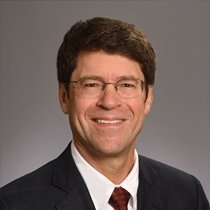Dr. G. Baker Hubbard III MD
Practice: Emory Eye Center
Location: Atlanta, Georgia
Website: http://www.eyecenter.emory.edu/
Phone: 404-778-2020
G. Baker Hubbard, MD is the Thomas M. Aaberg Chair in Ophthalmology within Emory University’s School of Medicine. He has served at Emory Eye Center since 2000 and currently holds the position of Chief of the section of Vitreoretinal Surgery & Disease. Additionally, he is Vice-chief of the Ophthalmology Service at Children’s Hospital of Atlanta, Egleston, and is past director of the Vitreoretinal Fellowship training at Emory Eye Center.
Dr. Hubbard is a graduate of Vanderbilt University School of Medicine (1988-1992), where he completed an internship (1992-1993) as well as a PGY-2 year in general surgery (1993-1994). Following that, he completed a fellowship in ophthalmic pathology at the Armed Forces Institute of Pathology in Washington, D.C. (1994-1995). In 1995 he entered a residency program at Emory Eye Center, completing it in 1998. His fellowship in vitreoretinal diseases and surgery followed at the Barnes Retina Institute, Washington University School of Medicine (1998-2000). He joined the faculty at Emory Eye Center in 2000, initially as an assistant professor, later rising to associate professor in 2006 and full professor in 2014.
-
Dr. Hubbard is a diplomate of the American Board of Ophthalmology. He is a fellow of the American Academy of Ophthalmology (AAO), where he is a member of the Secretariat for State Affairs. In 2008, he received the AAO’s Achievement Award. That same year, he received the Honor Award from the American Society of Retina Specialists (ASRS) and in 2011 he received the Senior Honor Award from the ASRS. He is a member of the Association for Research in Vision and Ophthalmology, the Macula Society, the Retina Society, the Association of Pediatric Retina Surgeons, and the Fellowship Compliance Committee of the Association of University Professors of Ophthalmology. He is past president of the Georgia Society of Ophthalmology.
Dr. Hubbard’s research is focused on characterizing the clinical aspects of vitreoretinal diseases. He has special interest in pediatric vitreoretinal disorders such as retinopathy of prematurity (ROP), Coats disease, pediatric retinal detachment, and pediatric tumors of the retina such as retinoblastoma (Rb). Through his significant body of work, he has contributed to the understanding and treatment of pediatric retinal disorders through clinical trials, lectures, and numerous publications. Dr. Hubbard has served as principal investigator for clinical trials dealing with ROP, Rb, age-related macular degeneration, diabetic macular edema, and retinal vein occlusions. While at Emory, he has been involved in over 30 clinical trials.
In his teaching capacity, Dr. Hubbard has supervised 32 vitreoretinal fellows, and the Emory ophthalmology residents have awarded him Role Model of the Year on two occasions, and Teacher of the Year once. He has published more than 80 articles and has been an invited speaker nationally and internationally. He is the host of Emory Eye Center’s Southeastern Vitreoretinal Seminar, an annual event, and organizes its Rb Kids Day, a day of celebration for the families of children with Rb. In 2009, he co-chaired Night of Spectacles, an annual fundraising event for the Georgia Lions Lighthouse Foundation.
-
Pediatric retinal disease
Retinopathy of prematurity
Retinoblastoma
-
Medical School: Vanderbilt University School of Medicine, Nashville TN, 1988-92
Internship: Vanderbilt University, 1992-93
Residency in General Surgery: Vanderbilt University, Nashville TN, 1993-94
Residency in Ophthalmology: Emory University School of Medicine, 1995-98
Fellowship in Ophthalmic Pathology: Armed Forces Institute of Pathology, 1994-95
Fellowship in Vitreoretinal Diseases & Surgery: Barnes Retina Institute, 1998-2000
Diplomate of the American Board of Ophthalmology

FAQ
At the Jack McGovern Coats’ Disease Foundation, we are often contacted by anxious parents or patients who are seeking information after receiving a diagnosis of Coats’ Disease. The questions below are provided as a resource to assist you as you and your doctor decide the best approach for treatment. These questions do not constitute any form of medical advice or diagnosis. Each patient is unique. An experienced retinal specialist who has examined the patient is the best source of information for diagnosis and treatment. We always recommend getting a second opinion.
-
Ahead of any treatments or procedures, it is important to ask yourself and the doctor the following questions:
How do you know that this is Coats’ Disease?
Has your doctor treated other patients with Coats’ Disease?
Have you sought a second opinion? If not, please consult our Doctor Directory for knowledgeable doctors in your area.
-
What Stage of Coats’ Disease is he/she in?
Will his/her vision get worse over time?
Will the eye have pain?
Will his/her eye start to turn out? Is muscle corrective surgery an option?
Are cataracts likely?
How likely is glaucoma? (due to retinal detachment)
Is there calcification?
What is the anticipated disease progression?
-
Is there a thorough vision exam available?
Where is the vision affected? (central/peripheral/distance)
Does he/she have depth perception? (3D visibility)
What about the non-Coats’ eye?
To what extent is his/her vision affected?
Will we be able to use this as a baseline to measure progress/decline?
Find a Doctor
Are you a Doctor?
Contact us to learn more about taking the White Coats to Cure Coats pledge today.






